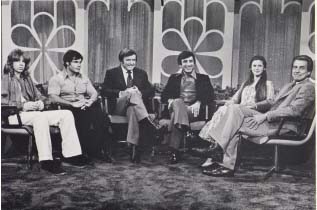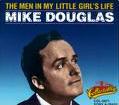|
|
|
 Mike pioneered the "co-host" strategy
of bringing on a single celebrity (or performing group) to
spend the entire week with him. Rarely were they names
from the big screen but good, comfortable TV folks with
whom we were familiar. The week of Oct. 10, 1966, provides
a sample. The Mike show in Daytona Beach featured
his old buddy Jimmy Dean as co-host. In Jacksonville,
we saw Rosemary Clooney. In Tallahassee, it was Chuck
Connors. In those days, the videotapes had to be "bicycled"
from station-to-station and the very small cities would
get the final bicycle six weeks after taping. On the big
wall behind the conversation set, the name would change
every week. If the co-host was Jim Nabors, the wall would
read MIKE & JIM.
Mike pioneered the "co-host" strategy
of bringing on a single celebrity (or performing group) to
spend the entire week with him. Rarely were they names
from the big screen but good, comfortable TV folks with
whom we were familiar. The week of Oct. 10, 1966, provides
a sample. The Mike show in Daytona Beach featured
his old buddy Jimmy Dean as co-host. In Jacksonville,
we saw Rosemary Clooney. In Tallahassee, it was Chuck
Connors. In those days, the videotapes had to be "bicycled"
from station-to-station and the very small cities would
get the final bicycle six weeks after taping. On the big
wall behind the conversation set, the name would change
every week. If the co-host was Jim Nabors, the wall would
read MIKE & JIM. We all felt as
if we were rooting for the hometown boy when Mike's tribute
to fatherhood, The Men in My Little Girl's Life
climbed to #3 on the Billboard charts. He sang it on
The Ed Sullivan Show to a spirited reaction. CBS
noticed him. During the 1966-67 season, Mike was brought
on as a guest co-host twice with Allen Funt on Candid
Camera. In the spring of 1967, Mike was tapped as
a celebrity player on the CBS Monday night version of
Password. Goodson-Todman would also bring Mike
on as a guest panelist in the waning days of the Sunday
night version of What's My Line?. Mark Goodson
frequently remarked how Mike would make "a great game
show host" for the G-T family (but his talk show was
becoming too lucrative). The year 1968 was a big one for Mike: he
sat in for Johnny Carson on one of the many Mondays Johnny
was away from The Tonight Show. He became the
first daytime performer to win an Emmy for Outstanding
Achievement in Daytime Programming. And to solidify his
stamp on American television, TV Guide splashed
Mike on its cover (though that issue is still not
included in the magazine's online cover gallery).
We all felt as
if we were rooting for the hometown boy when Mike's tribute
to fatherhood, The Men in My Little Girl's Life
climbed to #3 on the Billboard charts. He sang it on
The Ed Sullivan Show to a spirited reaction. CBS
noticed him. During the 1966-67 season, Mike was brought
on as a guest co-host twice with Allen Funt on Candid
Camera. In the spring of 1967, Mike was tapped as
a celebrity player on the CBS Monday night version of
Password. Goodson-Todman would also bring Mike
on as a guest panelist in the waning days of the Sunday
night version of What's My Line?. Mark Goodson
frequently remarked how Mike would make "a great game
show host" for the G-T family (but his talk show was
becoming too lucrative). The year 1968 was a big one for Mike: he
sat in for Johnny Carson on one of the many Mondays Johnny
was away from The Tonight Show. He became the
first daytime performer to win an Emmy for Outstanding
Achievement in Daytime Programming. And to solidify his
stamp on American television, TV Guide splashed
Mike on its cover (though that issue is still not
included in the magazine's online cover gallery). By this time, The Mike Douglas Show
had moved to Philadelphia in a bizarre series of circumstances.
The FCC had ruled a legal technicality between Group W
and NBC forced the two entities to swap their stations,
call letters and all, in Cleveland and Philadelphia. So,
the entire Mike Douglas team packed up for Philly in 1965 and,
after a short term in the station studios, converted to
color (the first week's color shows in 1967 originated
from Cypress Gardens) and a renovated facility in
Philadelphia's Independence Mall.
By this time, The Mike Douglas Show
had moved to Philadelphia in a bizarre series of circumstances.
The FCC had ruled a legal technicality between Group W
and NBC forced the two entities to swap their stations,
call letters and all, in Cleveland and Philadelphia. So,
the entire Mike Douglas team packed up for Philly in 1965 and,
after a short term in the station studios, converted to
color (the first week's color shows in 1967 originated
from Cypress Gardens) and a renovated facility in
Philadelphia's Independence Mall.
| Mike Frontpage | Mike 3 | Mike 4 | Mike 5 | Epilog | FAQ | Guestbook |